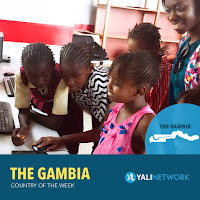 On the 14th
of July, 2017, I was selected as a 25 under 25 awardee by the Internet Society to
celebrate 25 young people who are under 25 years or 25 around the world who are taking action and
using the Internet as a force for good. This was my first time going
out of Africa and getting that visa I will say was a miracle. It was also my first time traveling alone but then I made it through though I struggled a bit as there were so many stops to get to Los Angeles. The award ceremony, which was held in California, Los
Angeles, USA for four days (16th to 20th of September, 2017) gave me the privilege of meeting those who
already have some years of experience with the Internet and meeting
other exceptional young people doing amazing work with the Internet.
I was able to network and learn a lot with a lot of people and the
ceremony. I spoke and shared
links of my initiative and success stories in the Gambia and how
other people can get involved. With my networking skills, I envision
a future where the unconnected get connected especially in my
community ensuring that everyone becomes web literate through my tech
club. I have no doubt that as I interact and learn from organizations
like the Internet Society and individuals from different parts of the
world I will be driven to
achieve greater things. Once again I am grateful to the Internet Society
for organizing such programs to recognize people like me that are doing
amazing work with the Internet.
On the 14th
of July, 2017, I was selected as a 25 under 25 awardee by the Internet Society to
celebrate 25 young people who are under 25 years or 25 around the world who are taking action and
using the Internet as a force for good. This was my first time going
out of Africa and getting that visa I will say was a miracle. It was also my first time traveling alone but then I made it through though I struggled a bit as there were so many stops to get to Los Angeles. The award ceremony, which was held in California, Los
Angeles, USA for four days (16th to 20th of September, 2017) gave me the privilege of meeting those who
already have some years of experience with the Internet and meeting
other exceptional young people doing amazing work with the Internet.
I was able to network and learn a lot with a lot of people and the
ceremony. I spoke and shared
links of my initiative and success stories in the Gambia and how
other people can get involved. With my networking skills, I envision
a future where the unconnected get connected especially in my
community ensuring that everyone becomes web literate through my tech
club. I have no doubt that as I interact and learn from organizations
like the Internet Society and individuals from different parts of the
world I will be driven to
achieve greater things. Once again I am grateful to the Internet Society
for organizing such programs to recognize people like me that are doing
amazing work with the Internet. Appreciation
It was overwhelming to be awarded a 25 under 25 awards by the Internet Society. I can't say much, I owe this to each and everyone who believes in me. I appreciate every single person who took time to nominate me for this prestigious award. To HackathonGirls, Banjul, Mozilla foundation, Django Girls, Banjul, The Internet Society Gambia Chapter, The American Corner, friends and my beloved family, you all contributed in making this possible for me. Can't thank you enough for your supports. I'm grateful.
Visit link for more details on the Recognition ceremony:
25 under 25 Recognition Ceremony









